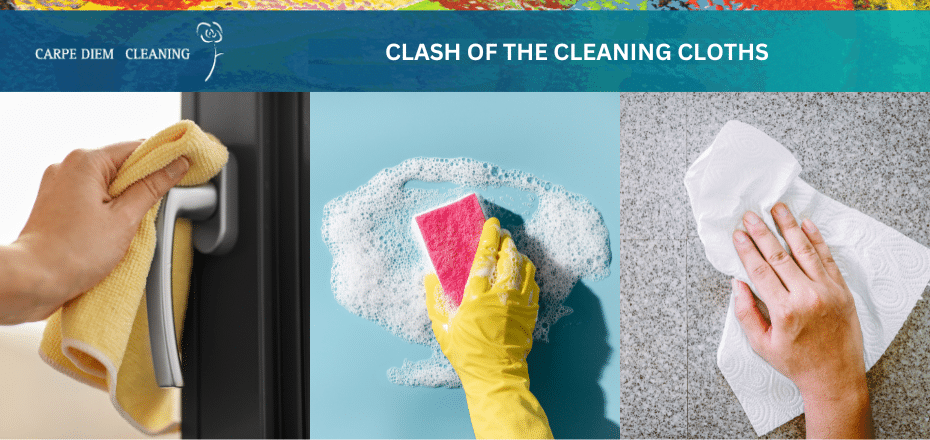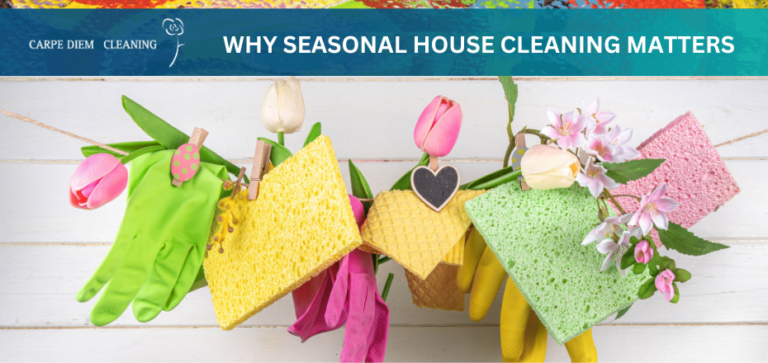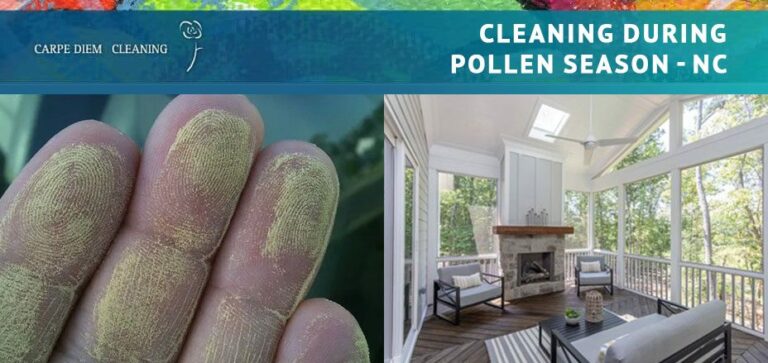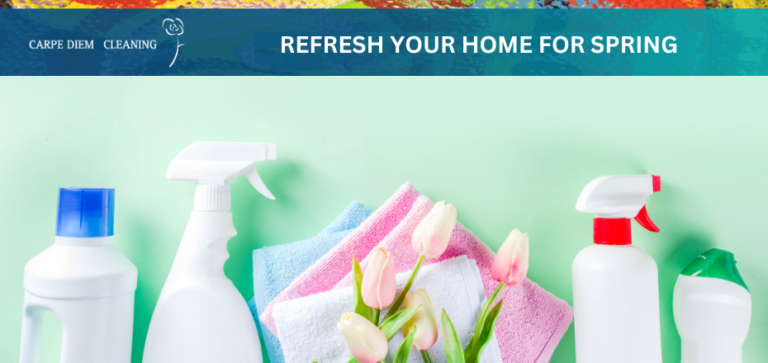
When you set out to gather your cleaning supplies, there are a lot of factors to consider. Among the most common questions to ask yourself: How well does this product work, what is its long-term impact on the environment, and how much does it cost? Carpe Diem Cleaning in Durham, North Carolina wants to be the friend that figures these things out so you can make the best decision for yourself and your family! Before we get the superhero qualities of these three cleaning companions.
The first thing to consider is the task at hand. We will then take a deep dive into the “towels” for cleaning; paper towels, sponges, and microfiber cloths. For the sake of this cleaning clash, we are going to look at many of the areas that we clean in our standard maintenance cleaning and our coveted deep cleaning. We tackle kitchen counters, sinks, cleaning the fridge and stovetop, and of course the bathroom, namely counters and sinks. For the contest, we will not be looking at cleaning the kitchen and bathroom floors or dusting. Maybe we will look at that next time!
Paper Towels
Pros:
- If you want to clean up messes that are laden with bacteria, there is no better option than paper towels. It is the quick and efficient one-time use and then immediate disposal that makes paper towels a hands-down family favorite.
- Pet owners wouldn’t want to be without paper towels. They’re great for cleaning up accidents.
- Paper towels are extremely absorbent. They can be used easily and conveniently for drying hands, as well as for getting rid of spills.
- They’re great to use in cooking applications for drying food. If you are preparing raw meat, a paper towel is a clear choice to have right next to you.
- Let’s state the obvious, you never have to launder a paper towel. They are disposable, so you just throw the used towel away and get a fresh and new one when necessary.
- They are low-cost and high value in specific tasks.
- They are easy to find unless you are in the middle of a pandemic.
Cons:
- Paper towels are not a friend to the environment. For a typical family, dependence on paper towels can mean many rolls of towels every month.
- It is important to remember that paper towels are made from trees and if you enjoy a walk in the forest, the idea may weigh heavily on your decision.
- Paper towels are not reusable in most cases. Even if you rinse and keep aside a paper towel after use, which let’s be honest, who does that?
- Paper towels are inexpensive initially, but the cost is high in the processing and the impact on the environment.
Sponges
Pros:
- Sponges absorb and hold liquid well and can last through some fairly tough cleaning jobs. They work well on bathroom surfaces and countertops as well as dishes and everyday spills.
- Many sponges have built-in scrubbing surfaces. The classic sponge has a soft side and a scrubbing side. This helps you get the stubborn and sticky areas on the counters.
- They are disposable and replaceable. Sponges can easily be disposed of in the trash after use.
- Since they’re disposable they’ll limit laundry needed in comparison to cloths.
- Sponges are affordable. For the most part, sponges are inexpensive and easily found nearly anywhere.
Cons:
- Your kitchen sponge needs to be cleaned routinely. During the course of using it each day, it will pick up and redistribute germs and bacteria to all areas of your kitchen surfaces – counters, sinks, and fridge doors. Cleaning your sponge can be time-consuming and gross. We could devote an entire blog post on myths and traps of thinking you can actually clean your sponge. At Carpe Diem Cleaning we are looking for ways for you to reduce the amount of time you have to clean, so you can do the things you want to do.
- Sponges can accumulate all manner of things and this makes them smell. No one wants to figure out where a kitchen smell is originating. It leads to more cleaning.
- Sponges tend to trap particles and become difficult to rinse out.
- It contributes to the spread of germs in your house. Because sponges are primarily moist and designed for absorption, they have the potential to pick up bacteria like salmonella, E. coli, and staphylococcus.
- Would it surprise you to know that your sponge needs to be replaced weekly?! Although the initial cost of sponges is low, the maintenance and replacement are high. Who wants to get a phone alert reminding them that they need to replace their sponge? No one.
Microfiber Cloths
Pros:
- Microfibers are also very efficient at cleaning water or other fluids in the case of any spilling. They are highly absorbent and can hold up to eight times its own weight with water!
- Due to their composition and how fine the fibers are, microfiber cloths are able to pick up and attract fluids and dirt very efficiently leaving a surface that’s streak-free.
- They remove 99 percent of bacteria on surfaces.
- Micro- Fiber cloths are known for their chemical-free cleaning – It’s safe for the environment and cleans with water, not harmful chemicals. The more fibers your cloth has, the lesser the need for chemicals or detergents. The essence and purpose of microfibers are that they are able to attract and attach dirt onto themselves.
- It saves money and outlasts other cleaning cloths.
- They’re easy to clean. Cleaning your microfiber cloths is a simple and easy task since you can just throw them in the washing machine. Even after washing your microfiber cloths on a weekly basis, they should be able to last at least 5-10 years. That makes them sustainable and earth-friendly.
Cons:
- Washing your microfiber cloths can be tedious and you need to plan ahead if you wash them in your home, since they do need to be washed separately from your other articles of clothing. To be safe, microfibers should never be washed or mixed with any other fluid other than water. Cold water is always better than hot water as it can partially melt the microfibers.
- Microfiber cloths are an investment. They do cost significantly more than conventional cleaning cloths. That is why it’s so important to care for your microfibers much more cautiously than cotton. If you want to extend the lifespan of your microfibers, stay diligent with care and maintenance methods and procedures to get the maximum value out of them.
- Microfiber is not a natural material. Although some microfiber is now being made from recycled PET plastic, which means it is well on its way to becoming more sustainable.
And... the winner is Micro-Fiber Cloths
Drum roll, please! And the winner of the Clash of the Cleaning Cloths according to Carpe Diem Cleaning…is the MICRO-FIBER CLOTHS. It is their durability, earth-friendly sustainability and ability to fight germs that made them the clear choice and winner!
Carpe Diem Cleaning's Cleaning Services
Let us help you keep up with keeping your home clean. We offer weekly and monthly cleanings, deep cleanings, move-in cleaning services, and pop-in cleanings to help you keep your home clean year-round.
Contact us today for a free home cleaning quote. We proudly serve Durham, Raleigh, Cary, Chapel Hill, and the surrounding area.
We’re reliable, responsive, and we do things right.





